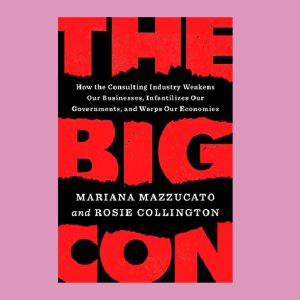By Sam Easter
Consultants go to work like the rest of us, but what do they do all day?
In the popular imagination, they push around spreadsheets and PowerPoint slides and whip lagging businesses – and laggard government agencies – into leaner, more efficient machines. Going by their ad copy, they’re the cure for sprawling bureaucracy, for redundancy, for the rot of public-sector complacency.
The Big Con: The Big Con: How the Consulting Industry Weakens Our Businesses, Infantilizes Our Governments, and Warps Our Economies, Mariana Mazzucato and Rosie Collinton’s insightful book about the industry, argues the opposite: the consulting field is itself a self-interested bureaucracy, one that’s displaced in-house experts, helped impose late-stage capitalism across the globe, weakened government agencies, and ignited costly boondoggles wherever it goes.
A consultant’s advice, they argue across hundreds of pages of interviews and research, is sometimes a helpful way for a CEO to do what she wants while keeping a fall-guy on hand. It’s sometimes shaped by consultants’ desire to please a big client, keeping a big future paycheck in play. And invariably, consultants’ advice is tailored to their own profit, the authors argue; no amount of sunny marketing can hide that they exist to make money first and serve customers second.
“In no other area of business do we overlook the risks of such a ‘moral hazard’ between individual consultants and their clients so much as in the consulting industry,” they note.
The book has a slew of disheartening examples of incompetence and self-interest: overspending and mismanagement in Britain and France as consultants responded to COVID; a Swedish hospital so beleaguered by the cost of consultants that it jeopardized medical jobs; short-sighted decisions to chase pharmaceutical profits that put shareholder value ahead of patients.
It will be no surprise that the book traces the rise of the consulting field alongside the popularity of neoliberalism – the belief that market-driven, highly privatized economies are best. Margaret Thatcher and Ronald Reagan are oft-mentioned bogeymen.
In fact, this is one of the book’s most fascinating implications: that big government – the kind lambasted as unwieldy and bureaucratic since the ‘80s and earlier – is on the losing end of a kind of branding war, one that the public sector has decisively lost. That result has deflated in-house government expertise and left it beholden to consultancies for managerial direction. Even when consultants’ advice is good – and that’s far from universal, Big Con argues – those profit-driven consultancies are able to charge indefinite, vampiric “rents” to agencies gutted by small-government ideologues.
There are plenty of galling real-world examples of these conflicts of interest across the book. One of the most notable is McKinsey and Co.’s contract to advise the Puerto Rican government on its debts – despite holding Puerto Rican bonds.
Probably one of the book’s most interesting aspects is its invitation to ponder the world we’ve abandoned by ceding so much expertise to private business. Think of NASA – one of the last truly prestigious government agencies outside the security sector, which has kept a (now eroding) monopoly on its industry’s top expertise. Is there another government organization that kids dream so much about joining? Is there another whose employees’ parents have so often beamed and said “my kid works there”?
Why shouldn’t accountants dream about working at the Internal Revenue Service? Why shouldn’t finance bros look at Securities and Exchange Commission jobs like coveted seats near the launch-pad? If those sound like silly questions, whose fault is that?
This is not a light book, and it’s especially short on colorful characters. Mazzucato and Collington have written something terribly insightful about how the world really works, and it’s a shame it’s not more readable. The trade-off appears to be in highly anonymized sourcing, which allowed them far-ranging insight but has unfortunately precluded the kind of juicy, character-driven scenes that could get somebody in trouble.
It’s nonetheless worth a reader’s time. The authors see their work as a call to action for significant reforms. It’s not an easy read, but it feels like an essential one.


